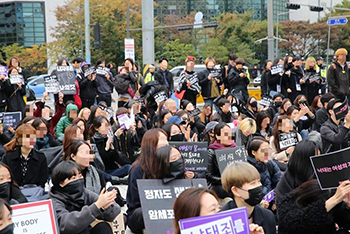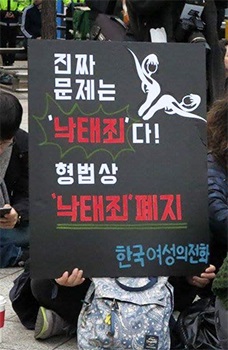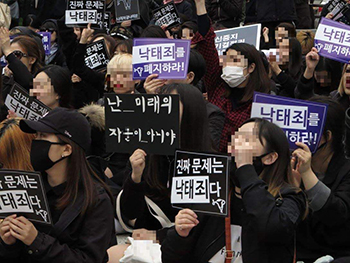


Korea has outlawed abortion since 1953 and criminalized doctors and patients involved in the procedure. On Sept. 22, the Ministry of Health and Welfare announced a bill that further intensified the punishment against abortion. The doctors’ license, which used to be suspended for a month when the doctor was caught aiding an abortion, will now be extended to a maximum of 12 months.
Since the revised bill was announced, doubts were aroused concerning the inclusion of women’s voice during the revision of a law that directly affects women more than anyone else. In demand for the repeal of abortion’s criminalization, “Black Protest” has swept across the nation.
The Black Protest derived from the Polish abortion protest that stretched worldwide with the slogan on Twitter tagging #mybodymychoice. The first Black Protest in Korea, organized by several major feminist associations, was held on Oct. 15 at Bosin-gak. All participants wore black clothes and masks to symbolize the voice that the government stole from women by enforcing the abortion law.
“For whom are the choice of giving birth and raising a child under an unprepared parent made?” spoke a Yonsei student, also an activist of a feminist organization, ‘Why Not Feminist?’ during the first Black Protest. “They tell us to not get an abortion for the life of the baby, but such a choice is neither for the baby nor the mother. Abortion is not a sin, but giving birth to a child in an unprepared condition is.”
Although the Ministry of Health and Welfare announced that it would reexamine the revised bill on Oct. 17, the Black Protest is expanding nationwide to Busan, Gwangju, and Daegu. The second Black Protest in Seoul was held on Oct. 29.
“If you have followed the history of the active movements of these protestors, you would know just how arbitrary the previous controversy between pro-life vs. pro-choice has been,” said Kim Joo-hee, an Ewha Professor in Women’s Studies. “With the slogan of ‘First care for life already born (women),’ the protestors let people realize that this issue is not about the fetus, but women’s lives.”
In Korea, any form of abortion has been illegal unless it met the qualification standards set by the Mother and Child Health Law: pregnancy from incest and rape, threat to a mother’s health, and genetic and contagious disease. The pregnancy duration must also be less than 24 weeks to be recognized as a legal abortion.
Protest against further criminalization of abortion has not only spurred movement domestically, but also internationally. Amnesty International urged the Korean government to cease criminalization of abortion altogether.
“Women’s body and health should be left entirely to women’s choice based on the doctor’s consultation rather than the pressure of politicians and administrators,” stated Amnesty International as it criticized the revised bill.
Women across the border are also banding together to support the Black Protest. Polish, Irish, and Argentine women have openly showed their support toward the Korean Black Protestors online. The initiator of the Black Protest, Polish women, even held another Black Protest in front of the Korean Embassy and posted a sign on Facebook that read, “Polish women did it. Now it’s your turn. Polish women solidarity with Korean women.”
“The core of this problem is the government’s perspective that tightening the abortion law can contribute towards reversing the sharp decrease in the Korean birthrate,” said Kim Jung-sun, an Ewha Professor in Women’s Studies. “A dichotomy of pro-life VS pro-choice, is thus meaningless because what will resolve Korea’s low fertility rate isn’t further criminalization of abortion, but rather, gender equality and a stable labor market.”

